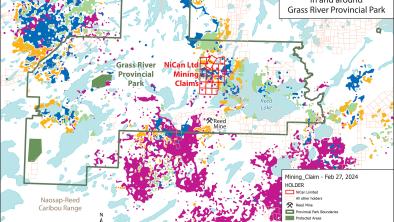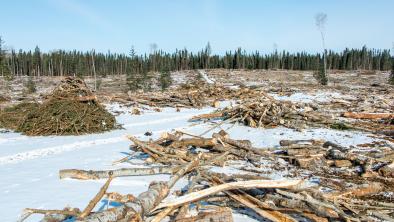Paper mill promises to meet 'regulatory obligations' as it winds down operation in The Pas
The Winnipeg Free Press

A spokesperson for Tolko Industries promised that the company will meet all environmental responsibilities as it ceases operating its pulp-and-paper mill operation in The Pas in early December.
"We are commited to meeting all our regulatory obligations," said Janice Lockyer, Tolko's communications advisor, told the Free Press on Wednesday. "We're going to be there for a long time yet. This process of closure is not an immediate thing."
Tolko announced earlier this week that the mill would shut on Dec. 2, laying off 332 employees, a significant loss of good-paying jobs in a community of 5,500.
Along with the economic impact of the job losses, a national environmental watchdog agency expressed concerns on Wednesday about the ecological liability of abandoning up to 2,000 kilometres of logging roads overseen by Tolko since the mill was purchased by the Vernon, B.C.-based company in 1997.
"Having Tolko abruptly put more than 300 people out of work is already painful enough," said Eric Reder, Manitoba campaign director for the Wilderness Committee. "The corporation can't be allowed to leave a mess of the northern forests too. We must show corporations that they can’t cut and run, leaving the public on the hook for millions of dollars and decades of damages."
Reder said if all-weather roads built over vast stretches of the north are abandoned it will negatively impact wildlife, such as moose and woodland caribou. Leaving the roads in place will make it easy for wolves to prey on moose and woodland caribou, as well as provide access for humans into forests that should be off-limits, he added.
Some of the communities affected by the mill’s closure should be given first crack at any decommissioning work, he said.
"They (Tolko) have this liability," Reder said. "Those marks will be on the land for a century."
Reder specifically cited Dickstone South Road, a 27-kilometre stretch built through Grass River Provincial Park. The Wilderness Committee tried to block the logging road's construction in court in 2012, but lost.
Now Reder said his organization- a registered non-profit society boasting a membership of 60,000 - will take the province to court if the road is not decommissioned - a process that includes breaking up gravel, pulling out bridges and culverts and hauling in soil.
Premier Brian Pallister called Reder's call for decommissioning roads "untimely" and "quite premature."
"We should not assume because Tolko does not wish to continue operations there, that we are forever destined to no more logging, no more pulp and paper or no more industries in that region," Pallister said during a media scrum at the Legislature on Wednesday. "That is an ill-conceived question, though I understand the concerns about the committee. I think it is premature."
Still, Reder is concerned the Tolko closure impact will mirror the result of the closure of a Tembec mill in 2010, where logging roads were also not decommissioned.
"They just left," Reder said. "They claimed they couldn't act because there was no money."
Which is why Reder isn't confident Tolko will not be held financially liable for the roads, either.
"There’s no chance the company has put up a bond big enough to decommission thousands of kilometres worth of roads," he said. "Do I have confidence the government will hold this company accountable? No."
In response, Lockyer insisted that although the plant will close on Dec. 2, the process of meeting environmental standards under the Forest Managment Licence - issued by the province for crown land - will take "months."
That will include replanting trees, maintaining growth areas and monitoring ground water, among other requirements - including decommissioning roads, she said.
"There's going to be lots of work that's going to happen yet," Lockyer added, noting that the mill was not closed because of financial constraints on the company, but because the mill that was no longer viable. "That doesn't mean we shut down the doors and leave everything. We have obligations we fully intend to meet."
Reder conceded his concerns about the roads - in light of the loss of jobs and economic impact of the company's closure on The Pas - might be considered dispassionate to the community.
"People don’t want to hear about the road right now," he said. "I’m the bad guy in the north. But putting out the ecological implications….somebody has to do it."
Read the original article here


